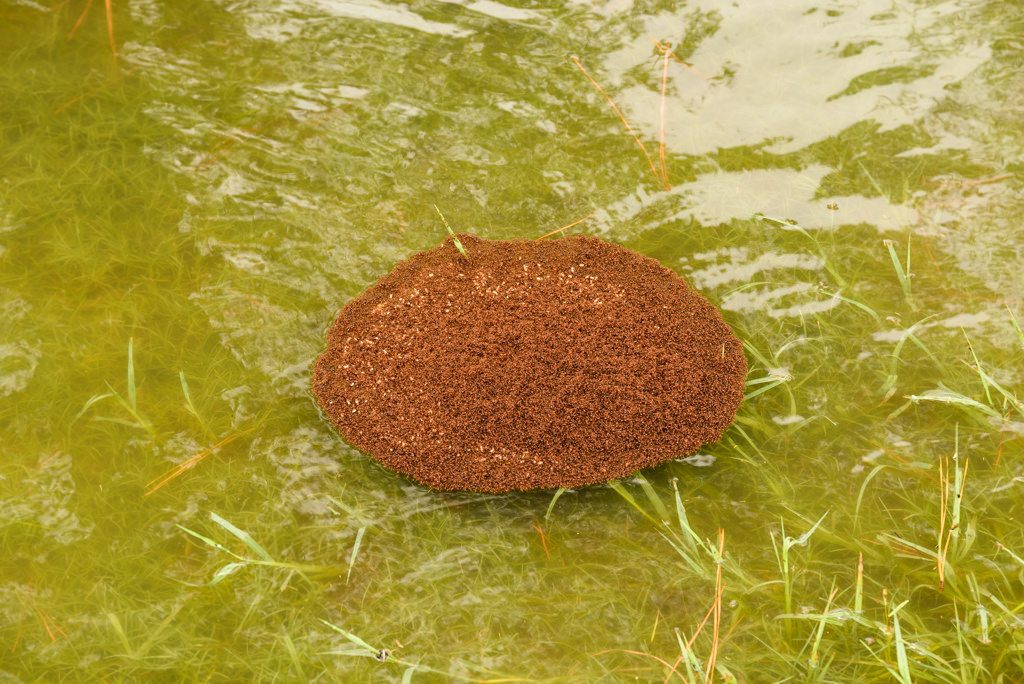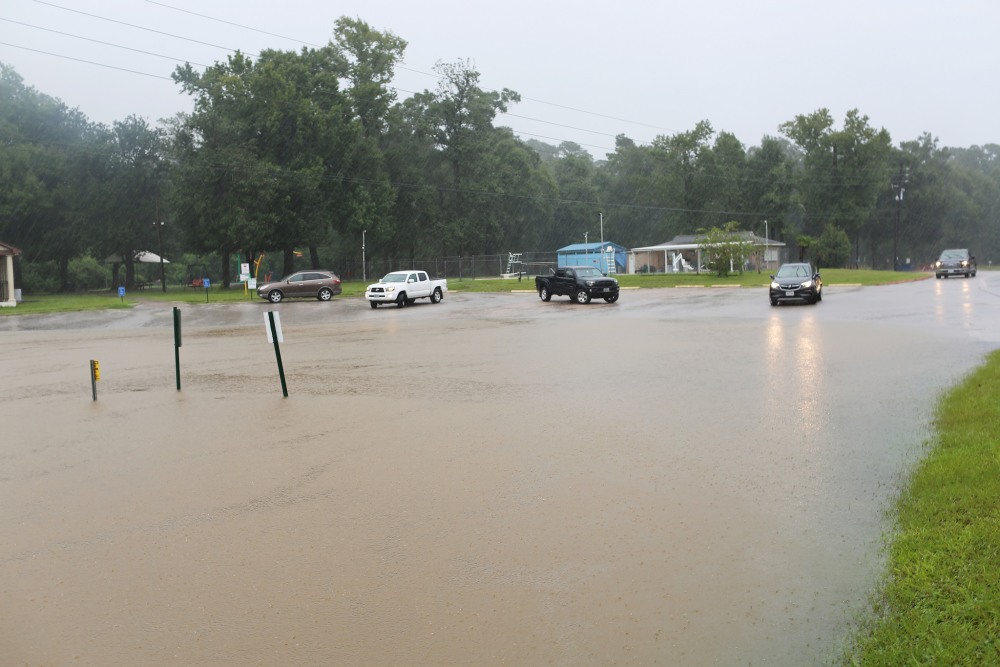Tuesday, 8:30am CT—Understandably, it is hard to think about what must be done after a natural disaster. We know the stress of the moment is nearly too much to bear—especially for those of you who are dealing with immediate flooding issues. Water in your home. A flooded business. A lost vehicle. All of our thoughts and prayers are with you.
We are not experts in disaster recovery, we’re just forecasters. But we can provide some basic information about what to do when the rains are finally over, and we all will have to face the reality of damaged or lost property. While it may be difficult to fathom a return to normalcy right now, we hope this information may prove useful in the coming days.
Home flooding
Though flood waters may begin receding from your neighborhood, do not go back into your home until authorities say it is safe (i.e. despite the temptation, do not drive around barriers). This may not happen until Thursday or Friday, as Harvey finally leaves the area. Roadways can appear safe, but flood waters could erode the ground from under the asphalt, creating sinkholes. Wait until roads are free of water and safe to drive before attempting to return. Avoid standing water as well—water could be electrically charged from power lines, or hide dangerous wildlife (think alligators, snakes, or floating beds of fire ants).

Once you get into your home, the first thing you should do is turn off the electricity at the main breaker, even if power is out in your community. Turn off the gas valves that feed into each individual appliance (stove, water heater, etc.). Then, carefully check your home to make sure there is no structural damage. Flood waters can put tremendous strain on the structure of a home. Take plenty of pictures of anything that is damaged, and contact your insurer immediately. As you begin any cleanup efforts, keep receipts. It may take insurance adjusters days or even weeks to assess your damage, so keep meticulous records. Finally, remember that flood insurance is a separate policy from homeowner’s insurance.
For advice on cleaning up, filing claims, or any other information you need, FEMA has a very thorough website on disaster assistance information. They also have a website set up specifically for Hurricane Harvey. Here, you can find contact information for FEMA, local Emergency Management agencies, and the National Flood Insurance Program. If you are unable to access their website, try their phone number at 1-800-621-FEMA.
Finally, this is likely to be an unprecedented natural disaster for the United States of America in terms of widespread damage. There will be ample federal resources in the forms of loans, grants, and other financial assistance to rebuild. But government moves fairly slowly, so it is not yet clear how this assistance will be rendered, or when.
Car flooding
Car flooding happens all too frequently in Houston, and Harvey is sure to flood tens or even hundreds of thousands of vehicles. Do not try to recover your car until flood waters completely subside. If your car was stuck on a roadway in Houston and was towed, this website can be helpful in finding it.

If you are not comfortable with car repairs and maintenance, the best thing you can do is have your car towed to a trusted auto mechanic. Contact your insurance company and let them know what happened. If the vehicle is in your possession, you should not try to start the car, as that may cause damage that cannot be repaired. You can also open all the doors of the car, and allow it to dry out before any repairs are attempted.
This report from KHOU describes further steps you should take if your car is damaged from flood waters. Some of you may be savvy enough in car repair where you can attempt some of their steps, but again—if you don’t know cars, err on the side of caution.
We will have a weather update by around 10am CT today.
Posted at 8:30am CT on Tuesday by Braniff

I would also recommend getting your insurance claim started before Sept 1. New laws (Texas HB) go into effect that may effect claims after Sept 1.
The new laws don’t affect the filing process or the payouts and have no bearing on whether or not you can file claims. Some predatory attorneys are pushing potential claimants to file before 1 September because the new law limits attorney fees in legal disputes between homeowners and insurance companies.
https://www.bizjournals.com/houston/news/2017/08/28/flooded-houstonians-urged-to-file-claims-promptly.html
Don’t worry about filing claims by September 1. There is no rush.
That is an incorrect statement; the new law most certainly does affect the processing of certain types of claims. A more accurate description can be found here:
http://www.raiznerlaw.com/blog/hurricane-harvey-insurance-claims-misinformation/
“The normal insurance claims process has not changed. Reform legislation passed in the last legislative session (HB 1774) goes into effect on September 1, 2017, and applies to lawsuits filed after that date.”
https://www.tortreform.com/press-release/statement-regarding-hurricane-harvey-and-hb-1774
Again, nothing about filing claims has changed. The law does not affect anyone’s ability to file insurance claims and claims filed after September 1 are the same as those filed after.
The new law only applies in instances where the claimants have initiated a lawsuit in order to force an insurance company providing wind insurance (not flood) to pay out after the companies have delayed doing so.
You’re affected by the 1 September law only if all of the following three points apply:
1) You need to file an insurance claim for wind damage
2) Your windstorm insurance is not with the Texas Windstorm Insurance Association
3) You need to sue your insurance company for failure to pay your claim
The overwhelming majority of Harvey damage in Houston will be flood-related, and the overwhelming majority of folks who do have wind damage will have their policy through TWIA (even if your home insurance is handled via a private insurance company).
Please don’t go nuts with telling people they must file claims by September 1. If their claims are flood-related, this is 100% incorrect, because the law has nothing to do with flood damage. Flood insurance is federally regulated and the TXlege has nothing to do with it.
Even if their claims are windstorm-related, the new law almost certainly has nothing to do with their circumstances.
The process has not changed, but the penalty for insurance company abuse of the process has. Bear in mind the website you link to is funded by insurance companies; of course they don’t want to pay greater penalties!
Lawyer here. Here are the details. The current law allows for an 18% penalty on wrongfully denied, delayed and/or underpaid claims. The purpose of the penalty is to encourage the insurance carrier to resolve the claim fairly and quickly and to punish those who drag their feet honoring the claim. For claims filed after Sept. 1, 2017, this penalty drops to 10% easing the penalty for wrongfully denying, delaying and/or underpaid claims. For those saying it is ok to wait, why would you give up your leverage to get your claim taken care of quickly? The sooner you file your claim, the earlier it will get resolved.
I am absolutely so proud of the news media the rescue teams the fire department & the police department and all the volunteers and I’m sorry that you have lost anything personal in this flood trying to help others my heart is full for you and totally respectFul! Stay Strong!
My understanding is that people should not turn off their gas at the meter! Positive pressure in the lines will keep moisture out. (even though post regulator pressure is less than 1 psi, it’s still enough)
Turn off gas at each shutoff valve by the stove, furnace etc
Also thanks for all your great work, this site is the best
Yes! I saw that the same thing.
Thanks! Our mistake. Fixing it now.
A question about Monday’s rain: Why were rain drops ‘bubbly’? Noticed that rain drops that were hitting the windows formed groups of bubbles as the slid down the glass…collecting in larger groups at the bottom of the glass. Though it interesting and never noticed the rain do that previously. Thx
Probably something that you used to clean your windows that was causing it to “bead” up. RainX does that for car windshields. Sometimes this is added to the wiper fluid on your car as well.
We left Houston before Harvey hit and need info about when highways will be open in order to return.
Eric tweeted this website, https://drivetexas.org/#/5/32.784/-106.652?future=false, near real time updates for road closures and high water
Thanks for the link – very useful.
You should not turn off your gas at the meter but rather at each device (if at all). The meters help regulate the pressure on your lines and prevent water from getting in. A quick Google search will turn up several utilities who confirm this.
http://floridagas.org/NaturalGasInformation/NaturalGasSafety/HurricanePreparedness/tabid/327/Default.aspx
Thanks! Our mistake. Fixing it now.
I live in Houston (Meyerland area) and went to Dallas on Fri. How do I know when it’s safe to drive back? My house was spared but the area obviously wasn’t. I’d take I-45 to 610. Thanks.
Eric tweeted this link, https://drivetexas.org/#/5/32.784/-106.652?future=false, near real time updates on high water and road closures
Mark – this website will give you a general idea about road conditions:
http://traffic.houstontranstar.org/layers/
As for specifics, I’m not sure.
We fixed the error that misstated turning gas off at the meter. Instead, turn off gas at the individual appliances (stove, water heater, etc.). Thanks for the catch, everyone!
Those asking about road status. This link is very helpful.
https://drivetexas.org/#/10/29.8419/-95.4022?future=false
It’s also time to start think big mosquito outbreak.
Empty stuff that will hold water, etc.
Are there resources for reporting down power lines? Our neighborhood was spared (for thost part) but water logged trees are falling and taking out power lines with them.
For those whose houses are ok but need to start saving water damaged family heirloom photographs, textiles, etc. here’s a good place for information and to search for a conservator.
http://www.conservation-us.org/resources/disaster-response-recovery#.WaWB0hROLFI
Thanks everyone for your response.
Yesterday you had a graphic from the NWS showing the rainfall totals from some Houston areas. I’d like to generate one for my area. I can’t find the right link. Can you provide it when you get the time? Thanks.
I greatly appreciate this site. Great no-hype information that is kept up to date.
One suggestion for this website. Eric and Matt are listed as the contributors, and have short bios. Braniff is clearly a contributor also, but (s)he’s not listed. Might want to add to the list. Many thanks to all three of you. Also to the many commenters who add good information.
Thank you, yes.
Good advice, but as to the gas… I heard or read that the gas companies warned not to turn off the gas, period. If structural damage has occurred or a leak is suspected, instead call the gas company and let the experts handle matters.